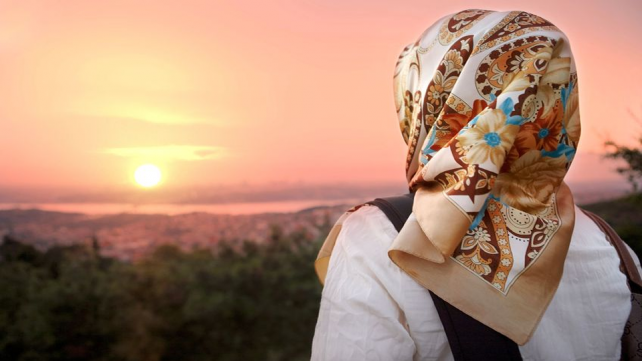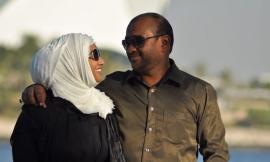
CHECK MATE
Muslim conferences and conventions (like the one being held by the Islamic Society of North America & Muslim American Society, Imam W. D. Mohammad) are just one of the many places Muslims in North America often meet potential spouses either to make a final decision or to initiate the marriage communication process.
Other places include fundraising dinners, regional seminars, lectures, at the home of a relative or friend, and the local mosque.
Sadly though, Islamic guidelines pertaining to proper conduct between men and women are not always respected at these meetings.
It is not uncommon to see or hear about potential candidates meeting in private, brothers and sisters “scoping the territory” for a spouse that looks good at Muslim events like conferences or lectures, or starting up a flirtatious conversation with someone they are interested in. None of these things fall within the guidelines of Islam.
Below are some Islamic principles, both general and specific, to consider if you will be meeting or seeking a potential spouse for yourself or someone else at a conference, lecture, the mosque or another event:
1. Ask yourself: Why am I getting married.
This is a good question to ask even if you are meeting the person to make a final decision because it will be a reminder about the real purpose of marriage from an Islamic perspective.
Marriage is part of faith and it is part of the Sunnah of the Prophet Muhammad, peace and blessings be upon him.
As well, “my intention should be I am looking for someone with whom I will build a family,” says Imam Muhammad Nur Abdullah, a member of the North American Fiqh Council. He conducted pre-marriage counseling in the U.S. for two decades.
“Marriage is a commitment and relationship that starts in this Dunya (world) and will continue Insha Allah in Paradise together,” he adds.
2. Ask yourself: what am I looking for in a spouse.
Abu Hurairah related that the Prophet said: “Men choose women for four reasons: for their money, for their rank, for their beauty and for their religion, but marry one who is religious and you will succeed” (Bukhari, Muslim).
This of course, applies to women as well.
However, religion it seems, is not always foremost in the minds of many people. In fact, it's probably the last factor on too many Muslims' list.
According to Tasneem Qadeer, one of the seven volunteers who runs the Islamic Society of North America's matrimonial service, being a doctor or a lawyer is much more important to many Muslim women than piety.
And the men are not any better. Many matrimonial advertisements in Islamic publications for instance, demonstrate a key demand for a wife who is “fair, slim and beautiful”.
“If we want to have healthy Muslim families then Deen has to be first,” says Aneesah Nadir, president of the Islamic Social Services Association of the United States and Canada.
She is one of the co-developers of the program “Marriage the Islamic way”, which teaches various aspects of marriage such as how to find a spouse, the wedding and the post-wedding marriage relationship.
3. If you're looking for a spouse lower your gaze.
This may seem like a contradiction, but it's not. Looking for a spouse who has the right qualities and whom you are physically attracted to does not mean throwing out the obligation to lower the gaze for both sexes.
“Tell the believing men to lower their gaze and be modest. That is purer for them. Lo! Allah is aware of what they do” (Quran 24:30).
“And tell the believing women to lower their gaze and be modest, and to display of their adornment only that which is apparent, and to draw their veils over their bosoms...” (Quran 24:31).
“Scoping the territory”, from this perspective, would not be Islamically acceptable.
Imam Nur Abdullah notes that looking at a potential mate is recommended according to the Hadith in which the Prophet said: “When one of you asked a woman in marriage, if he is able to look at what will induce him to marry her, he should do so. ...” (Abu Dawud).
This means the two potential spouses can look at each other but not ogle or stare.
Abdullah also notes there is no limit on the number of times the two people can look at each other. However, both should fear Allah and remember the purpose of this is to satisfy the need for physical attraction to the person you are marrying.
He also notes it is not permissible for a man to see a potential wife without Hijab, since he is not her Mahram (a relative with whom marriage is not possible, or her husband). Abdullah says seeing her face and hands are enough to determine attraction.
4. Get someone to help
Marriage is not something to throw yourself into all by yourself. Getting the help of someone, especially parents, relatives, an Imam, and/or respected and trustworthy members of the Muslim community to either look for the right spouse or initiate and participate in a communication process is very important.
Involving others, by the way, does not mean signing over your right to say yes or no to a marriage proposal. It simply increases the likelihood of finding out important information about a prospective partner in a way that maintains rules of Islamic modesty (i.e. not meeting alone, see next point).
Getting that third party involved also helps verify if the person you are interested in is decent, honest and respectful. This person(s) often checks out references, asks about the individual's character and behavior, and looks out for your best interest in general.
This person should be a trustworthy Muslim, since you are seeking a Muslim in marriage, and would want someone familiar with the Islamic way of doing things.
For those blessed with Muslim parents, remember that they are probably your best allies and helpers in seeking the right husband or wife. They have known you all of your life, and have your best interest at heart.
However, parents must be open and attentive to what their children are looking for, and never forget the element of choice. Ultimately, it is their son or daughter who is going to make the final decision. They must never become too pushy or aggressive, whether this pressure is being applied on their own son or daughter, or on the person s/he is interested in.
If parents, other family members, an Imam or members of the community are not available, you can also try seeking a husband or wife through the matrimonial services offered by a number of different Muslim organizations.
5. Always ask for references
This is also where your “third party” comes in handy. Not only will they be able to be your reference. They can also check out a prospective mate's references.
A reference can include an Imam who knows the brother who proposed to you, a sister who knows the woman you may want to marry well, a family friend, a boss, a co-worker, and/or business partner.
A note about honesty and references: the people you ask may know something not very nice about your prospective spouse. Remind them that if they reveal this information, they would not be backbiting from the Islamic perspective. In fact, in the case of seeking marriage, complete information should be given about an individual, both good and bad.
The advice of one of the companions of the Prophet, Umar Ibn al-Khattab, can help in this regard:
A man came to Umar ibn al-Khattab and spoke in praise of another. Umar asked him: “Are you his nearest neighbor such that you know his goings and his comings?”
“No.”
“Have you been his companion on a journey so that you could see evidence of his good character?”
“No.”
“Have you had dealings with him involving dinars and dirhams [money] which would indicate the piety of the man?”
“No.”
“I think you saw him standing in the mosque muttering the Quran and moving his head up and down?”
“Yes.”
“Go, for you do not know him...”
And to the man in question, Umar said, “Go and bring me someone who knows you.”
(quoted from Islam The Natural Way by Abdul Wahid Hamid, p. 66)
This gives you three types of people you can ask about a prospective mate's character: a neighbor, business colleague or someone who has traveled with them.
6. When you meet, don't be alone
The Prophet said: “Whenever a man is alone with a woman the Shaytan makes a third” (Tirmidhi).
He also advised men: “Not one of you should meet a woman alone unless she is accompanied by a relative within the prohibited degrees” (Bukhari, Muslim).
Meeting alone, in the hotel room during a conference for instance, is not permissible. The prospective spouses should not place themselves in a situation where no one else can see or hear them.
Instead, a discreet, chaperoned meeting should be set up. The chaperone, while allowing the two to talk, is in the same room, for example.
As well, parents or guardians should set a time limit, recommends Shahina Siddiqui, president of the Islamic Social Services Association‘s Canada branch. A whole day, for example, is too long for this kind of a meeting.
7. When you speak, be businesslike and to the point.
The purpose of meeting and talking to each other must also remain within Islamic guidelines. That means no flirtatious speech of a sexual nature on either side.
Imam Nur Abdullah says some of the topics discussed can include each other's interests, financial situation of the man, who is Islamically responsible for providing for his wife and children, and the two potential spouses' relationship with their parents.
He notes that conversations between potential mates cannot be talking just for the sake of talking. There should be a firm and clear intention of either pursuing engagement and marriage, or, if one of the two or both the man and woman feel they are not compatible, a quick end to the relationship.
This ensures both sides are safe from getting hurt more than they could in this kind of a situation and remain within the bounds of Islam, Insha Allah.
With regards to questions pertaining to a person's sexual history (for example, has s/he had a boy/girlfriend, does s/he have any type of sexually transmitted diseases), Imam Nur Abdullah says these things have to be investigated at the very beginning, when the communication for marriage begins. This is not something that should be brought up at the last stage.
Other topics that should also be discussed at the early stages include level of Islamic knowledge and practice, future career and education plans, home making skills and where the couple will live right after marriage and in the future (state and/or country, with in-laws or in their own apartment/home).
The Imam also says the couple can even get a blood test to ensure both are healthy. Some states require this before marriage.
Seeking marriage is something highly recommended in Islam. While looking for a potential mate should be something Muslims help each other with, this cannot be done at the expense of Islamic rules pertaining to modesty and respect between the sexes.
--------------------------
Samana Siddiqui is Sound Vision's Content Manager. She is also a reporter and columnist for the Chicago Crescent newspaper.








Comments
Kind of purposal
WalaikumSalaam. I m a reverted muslim i m living with my christian parents .and i am looking for a Muslim lady to marry i am 25 and i belong to a Middle class family.
Location
Is virginity a matter in islam
I wish to marry a guy who was not married and is not a virgin. Is it right according to islam for a virgin girl to marry a guy who had a previous relation ?
Location
look for husband
Good description regarding marriage. I'm devorced before a year, i hv a daughter. Now i want to settle an adored family. Looking for a husband who has real iman. I am 33.
Location
Proposal help
Assalamuaykum!
Firstly, may I begin by thanking you for helping those brothers and sisters in a matter which is deemed as 'life changing'. I've recently made intention to get married and I've come across a sister who I'm quite fond off. She prays and practise islam to the best of her ability. I have only met her once and I've mentioned explicitly - that if this is going to work we must respect our religion (no dating) as she agreed with me. She is someone who I see a real potential with amazing character with similar expectations. However, there is one thing that I'm finding very difficult to comprehend and that is she doesn't wear the hijab. I have explicitly said to her that i would want a wife who does wear the hijab but not for my sake - rather to please allah (SWA). She said, "when the time is right - in shah allah". I know it takes time for sisters to make such decision in their lives and I respect that however, in-terms of marriage this is a critical stage in my life and I want to complete half my deen to please Allah - not to upset him in shaa allah. Please advice me on the decision on whether i should reject this proposal based on the fact that she doesn't wear the hijab.
Thank you again for taking the opportunity to read my comment.
Location
Advice
Please continue advicing her and pray for Her to change towards the better. With all those qualities, in sha Allah
U wont fail to make her wear hijab and marry her with the help of Allah
If she persist on wearing it, go and search, for after all if Allah has predistined for u. U shall get her and pure and chaste when the time arrives
Location
pray
most women with until after marriage before they change if she has the intention insha-Allah she will change, you can go ahead with the marriage right away and continue to guide her. most importantly she is your sister islam and she is a muslim..
Location
decision making
i have been getting a number of proposals for the last few years. Many proposals my parents rejected and many i rejected. Recently i got engaged to a guy whom i am not attracted to physically. But i was forced to obey to parents will as the rest things about guy is perfect. I am breaking the engagement as i went into depression soon after.
I find it really hard to decide on my life partner as i am not able to make compromise on
1) guys looks
2) i would love to work,study after marriage
3) guys location
4) his parents
my parents are not ready to compromise on
1) guys financial status as they feel he should be equally wealthy as us
2) guys lineage
Many guys are rejecting me too for various reasons. Even a divorcee rejected me.
I am getting aged and my parents are too worried thinking of my future.
Kindly advice.
Location
Decision making
i AM FACING THE SAME PROBLEM...
Location
Have Faith in Allah. !
Dear Zahra,
Calm down and wait for the right time.
If you guys along with family is trying for this sacred thing you are doing your part. So Allah will have mercy on you for having a compatible partner.
If you are rejecting people for financial grounds then you should review also. But if you are rejecting people for being afraid of not being happy or religious factor that makes sense.
Its an old post.
Hope you have already met your spouse !
Location
"aged"
Don't worry about getting aged sister. Use organic phytoestrogen sources to have more time on your side, Inshallah.
Location
Pages
Add new comment